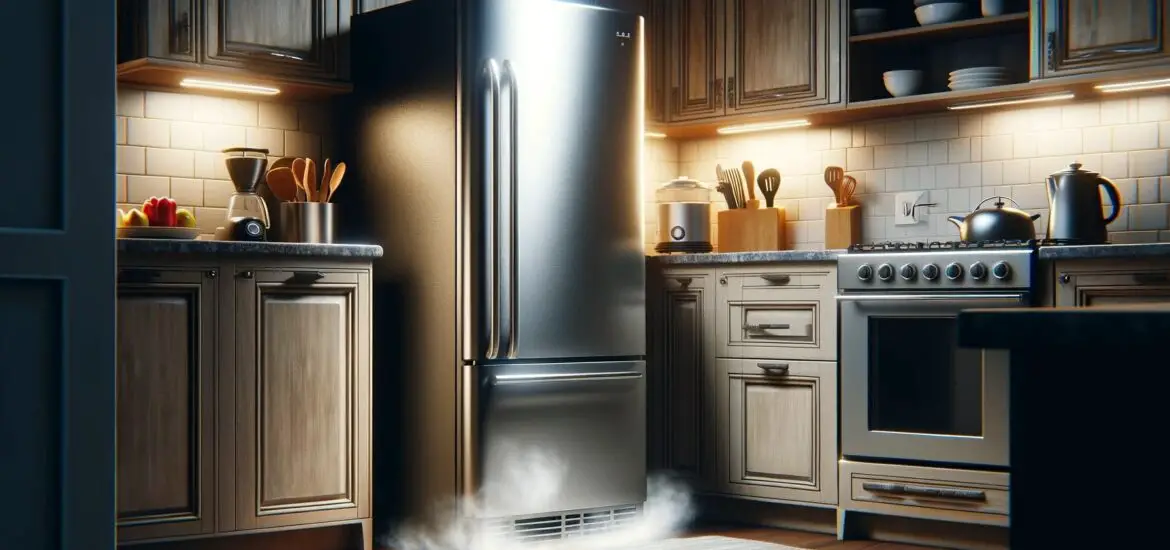This article will guide you on how to tell if Freon is leaking in a fridge, and also provide you with the knowledge to take action.

Table of Contents
Step 1: Identify Common Signs of Freon Leak
Freon leaks can be subtle, but certain signs can indicate their presence. Here’s what to look out for:
Reduced Cooling Efficiency
The most direct sign of a potential Freon leak is a decrease in your refrigerator’s cooling ability. If your fridge seems warmer than usual or takes longer to cool food, it could be due to Freon escaping from the system. Regularly check the temperature and compare it with the setting on the thermostat.
Chemical Smell
Freon, a refrigerant, can emit a light chloroform-like smell when leaking. This odor can be difficult to detect, so pay close attention to any unusual smells in the area surrounding your fridge. Remember, Freon is odorless in its natural state; the smell comes from additives in the gas.
Oily Residue
Freon leaks can sometimes leave a visible trace. This residue can appear as a greasy or oily substance near the compressor of the fridge or on the floor beneath it. If you notice such residue, it’s a strong indication of a Freon leak, especially if accompanied by other signs.
Step 2: Check for Hissing Sounds
A hissing sound coming from your fridge can be a key indicator of a Freon leak. To properly check for this:
Ensure the room is as quiet as possible. Turn off any background noise.
Listen closely to the back of the fridge where the compressor and coils are located.
A hissing or bubbling sound can indicate gas escaping from the refrigerant system. Note that this sound may be intermittent, so you might need to observe for a while.
Step 3: Inspect the Coils
The coils at the back of the fridge are essential for the cooling process, and damage here can be a sign of a Freon leak:
First, unplug your fridge for safety.
Visually inspect the coils for any signs of damage such as cracks, holes, or unusual corrosion.
Check for excessive frost build-up. While some frost is normal, an abnormal amount can indicate a leak.
If you notice any of these signs, it could mean the Freon is not circulating properly and might be leaking.
Step 4: Use a Leak Detector
If you’re still unsure about a leak, a Freon leak detector can help:
Freon leak detectors are available at hardware stores or online. Choose a model suitable for refrigerant leaks.
Follow the instructions carefully. Typically, you’ll need to pass the detector around the areas of the fridge where a leak is suspected, such as near the coils and compressor.
These detectors can pinpoint the exact location of a leak, making it easier to address.
You can get this LotFancy Freon Leak Detector from Walmart.
Step 5: Addressing Freon Leaks When the Fridge is Off
Freon leaks can occur even when your fridge is turned off:
Look for the signs mentioned earlier, such as oily residue or chemical smells.
When you turn the fridge back on, observe it closely for any of the signs of a leak, as the compressor’s operation might exacerbate or reveal the leak more clearly.
Listen for hissing sounds after the fridge has been turned on for a few minutes, as leaks may become more apparent when the system is active.
If your fridge has been off for a while, it’s also a good idea to monitor its cooling efficiency once it’s back on, as a decrease in performance could indicate a leak.
Step 6: Seek Professional Help
If after following these steps, you’re still uncertain or have confirmed a Freon leak, it’s crucial to seek professional assistance:
Refrigeration systems are complex and handling Freon requires specialized knowledge and tools.
A professional technician can safely identify and repair leaks, ensuring your fridge operates efficiently and safely.
In addition, they can check for other potential issues and perform necessary maintenance to prevent future leaks.
Remember, attempting to fix a Freon leak on your own can be dangerous and might lead to further damage to your refrigerator or harm to your health.
Addressing Freon leaks in your fridge is crucial for its efficient operation and your safety. While identifying a leak can be tricky, following these steps methodically will help you determine if there is an issue. However, when it comes to repairs, always rely on a qualified professional to handle refrigerants and fix the problem safely and effectively.
